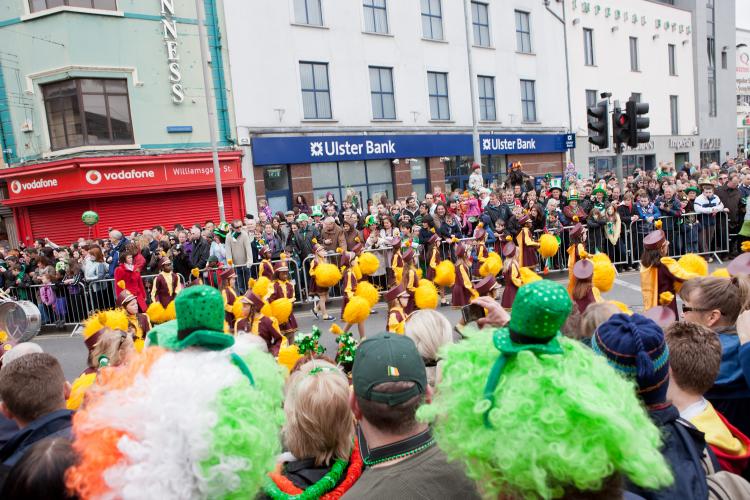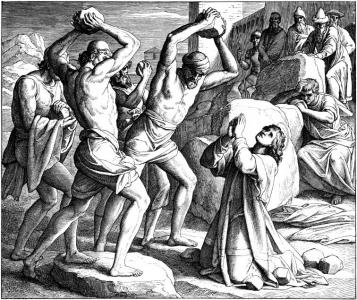
Do You Get a Black Moon?
What is a Black Moon, and why does it happen in December?
St Patrick's Day (Lá Fhéile Pádraig) is Ireland's national holiday. People hold parades and festivals to celebrate Irish culture on the day.
St. Patrick's Day is a public holiday. It is a day off for the general population, and schools and most businesses are closed.

Cheerful people attending a St Patrick's day parade in Galway, Ireland.
©iStockphoto.com/MediaProduction
People throughout Ireland hold parades and festivals that celebrate Irish culture. The largest parade is in Dublin. Many towns and villages also have their own parade. Local musicians often perform during the parades. Week long festivals of Irish visual and performing arts and music are held in many regions. The atmosphere is welcoming and friendly.
Banks, post offices and many other businesses and organizations are closed in Ireland on St Patrick's Day. However, stores and pubs are generally open, although they may open later and close earlier than usual. Public transport service schedules vary depending on where one lives and intends to travel. There may be some local disruption to traffic because of the parades and large scale celebrations, particularly in Dublin.
If a public holiday in Ireland falls on a Saturday or Sunday, many people get the following Monday off, although this is not guaranteed by law. Employers may also opt for alternative ways of compensating their workers, such as granting a paid day off within one month of the public holiday, an extra day of annual leave, or an additional day's pay.
Saint Patrick was born in 387 CE and grew up near the present day border between Scotland and England. He was taken to Ireland as a slave when he was 16. He fled back to Great Britain after six years before returning to Ireland as a missionary later in his life. He played an important role in converting Ireland's inhabitants to Christianity. According to legend, he drove all snakes from the island, although these "snakes" probably represent a particular group of pagans or druids.
7 holidays with dark histories
Many Christians believe that Patrick died on March 17 in the year 461 CE or 493 CE. He is buried below Down Cathedral in Downpatrick, County Down. He was never formally canonized but many Christian churches view him as a saint. St Patrick, St Brigid of Kildare and St Columba are Ireland's patron saints.
St Patrick's Day became a public holiday in Ireland due to the Bank Holiday (Ireland) Act 1903. It is also celebrated around the world, particularly in the United States, the United Kingdom, Australia, and Canada.
The shamrock, the Republic of Ireland's flag, and the colors green, white and orange are St Patrick's Day symbols. The shamrock is the leaf of the clover plant and an Irish Catholic symbol of the Holy Trinity. It is also a symbol of Ireland and a registered trademark of the Republic of Ireland. The Republic of Ireland's flag is twice as wide as it is high and consists of three vertical bars colored green, white and orange.
| Year | Weekday | Date | Name | Holiday Type |
|---|---|---|---|---|
| 2019 | Sun | Mar 17 | St. Patrick's Day | National Holiday |
| 2020 | Tue | Mar 17 | St. Patrick's Day | National Holiday |
| 2021 | Wed | Mar 17 | St. Patrick's Day | National Holiday |
| 2022 | Thu | Mar 17 | St. Patrick's Day | National Holiday |
| 2023 | Fri | Mar 17 | St. Patrick's Day | National Holiday |
| 2024 | Sun | Mar 17 | St. Patrick's Day | National Holiday |
| 2025 | Mon | Mar 17 | St. Patrick's Day | National Holiday |
| 2026 | Tue | Mar 17 | St. Patrick's Day | National Holiday |
| 2027 | Wed | Mar 17 | St. Patrick's Day | National Holiday |
| 2028 | Fri | Mar 17 | St. Patrick's Day | National Holiday |
| 2029 | Sat | Mar 17 | St. Patrick's Day | National Holiday |
While we diligently research and update our holiday dates, some of the information in the table above may be preliminary. If you find an error, please let us know.

What is a Black Moon, and why does it happen in December?

When will the next comet be visible?

Why do mornings keep getting darker after the December solstice?

St Stephen's Day commemorates the life of St Stephen, an early Christian martyr. It is a public holiday in the Republic of Ireland.